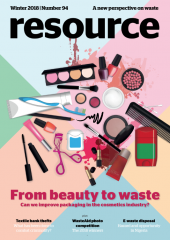Rethinking recycling in East Devon
East Devon District Council is gradually gaining recognition for its environmental credentials following its switch to a hybrid waste collection service. Resource learns more about the council’s approach
As central government mandates ever higher recycling targets whilst the UK continues to produce more and more waste packaging, it’s been difficult for local authorities to find a solution to the waste problem that doesn’t break the bank and has the backing of the residents. East Devon District Council may just have found an answer. In 2017, the local authority of 69,000 households overhauled its old waste collections, and delivered a service change following the end of its contract with Sita (now SUEZ). At this time the council’s recycling rate hovered at around 43 per cent before plateauing, a fairly typical story for an English local authority.
With a determination to push towards the 50 per cent recycling target for 2020, coupled with enthusiasm from residents demonstrated in the positive responses to a residents’ survey, the council moved to a new hybrid system. Building on the existing service to implement what the council’s Recycling and Waste Manager, Gareth Bourton, calls “enhanced recycling and restrictive refuse capacity”, the council focused on quality rather than quantity of recycling through its hybrid system rather than a single-stream system as many councils have turned to.
Previously, the council had a system simply made up of a food waste collection and a basic kerbside sorting system in which only plastic bottles were collected, leaving cardboard, cartons and mixed plastics to go into the general waste.
The new system is composed of four separate parts: a separate food waste bin, a co-mingled recyclables sack for aluminium and steel products and plastic cartons and a kerbside recycling box for cardboard, paper, glass, textiles, shoes and small electricals, all collected on a weekly basis, while household refuse is kept in a 180-litre bin and collected every three weeks.
A small footprint Materials Recycling Facility (MRF) then sorts the contents of the co-mingled sack, removing the metal, while the mixed plastics are then sold to Roydon Polythene in Swinton and the cartons are sold to ACE in Halifax.
The new system has had a significant effect, with East Devon reporting a 57 per cent recycling rate since its introduction, and gaining plaudits after being named as international Green World Ambassador and winner of the Devon Environmental Business Initiative. Yet, the most distinguishing feature of this new service is the lengths the council has gone to communicate changes to residents. While East Devon has a high proportion of residents over 70 who tend to be more committed to recycling – who Bourton calls “born again recyclers” – there is also a high number of young families that need a bit more encouragement due to time constraints.
“During the mobilisation I had four temporary recycling advisors who were just purely mobile, on the end of a tablet and a mobile phone,” Bourton explained. “They were just doing constant visits for anybody that needed any help, and they were crucial.”
Cllr Tom Wright, the district council’s portfolio holder for the environment, added: “Councillors were and continue to be totally committed to the new service and through their work with households it became a real team effort between residents, councillors, officers and our contractors.”
 This article was taken from Issue 94
This article was taken from Issue 94This noteworthy approach towards its residents includes naming some of the population as ‘recycling champions’, as Bourton explains: “They let us take pictures of themselves and their families recycling and they feature heavily in our material. Our emphasis is to get our customers talking to our customers, so we let them do radio and TV interviews.”
The council has also remained business-savvy. Working with SUEZ – which won the service contract after a change of management – both companies have altered their practices and now run a 50/50 profit share over the collection services. Bourton said: “We’re running a partnership rather than a contract, we’re running a joint business.”
And East Devon’s commercial designs don’t end there: “We’ve built our MRF slightly oversized so as another commercial venture we would like to sell some capacity to a partner or local authority if we can”, explains Bourton. The council is also offering green waste collection services in a 240-litre bin for £48 per year, which saw a 13 per cent participation rate on its launch in May 2018, and are considering introducing a cardboard-recycling sack, due to the rise of cardboard packaging for online purchases.
As English local authorities increasingly turn towards co-mingled collections to cut costs, East Devon’s hybrid system and communication with residents show that there is a way forward for councils that want to increase recycling rates and collect quality materials without breaking the bank.




